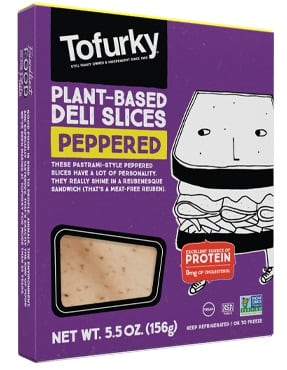Louisiana’s ‘Truth in Labeling of Food Products’ Act 273 - which took effect October 2020 - takes a broad swipe at everything from plant-based meat and edible insects to cauliflower ‘rice’ and cell-cultured meat (which isn’t on the market yet), and effectively prohibits firms from using meaty terms on products even when accompanied by clear modifiers such as ‘vegan’ or ‘plant-based’ unless they are derived from the carcass of a slaughtered animal.
The Good Food Institute and The Animal Legal Defense Fund - representing plant-based brand Tofurky, a plaintiff in several lawsuits challenging such state laws – claim Act 273 violates the First Amendment by improperly censoring truthful commercial speech.
Judge: Law 'impermissibly restricts commercial speech’
In a March 28 ruling granted Tofurky's motion for summary judgment in a lawsuit* challenging Act 273, Judge Brian A Jackson at the US District Court, Middle District of Louisiana, agreed with this assessment, arguing that the Act is “unconstitutional” and “impermissibly restricts commercial speech because the speech at issue is not misleading.”
According to Jackson: "In response to the Act, Plaintiff has refrained from using certain words and images on marketing materials and packages and has removed videos from its website and social media..."
The fact that Tofurky has not (yet) been fined for violating the Act did not mean it was not highly problematic, he added: “Plaintiff’s speech has been chilled by the Act.”
Meanwhile, he said, while Tofurky has presented “compelling evidence indicating that consumers are not confused by its labeling,” the state “fails to produce evidence indicating that consumers are confused” by Tofurky’s labels, which use terms such as chick’n, burgers, bacon, ham, and sausages with modifiers such as ‘vegan’ or ‘plant-based.’
ALDF: Act 273 is a ‘clear and unconstitutional attempt to protect the animal agriculture industry from competition’

Laura Braden, Lead Regulatory Counsel at nonprofit The Good Food Institute (GFI), which promotes plant-based, fermentation-based, and cell-cultured meat, said: “Consumers are not confusing veggie burgers for beef burgers when labels clearly indicate the products are plant-based, meatless, vegetarian, or vegan, and it insults their intelligence to suggest otherwise.”
Speaking to FoodNavigator-USA today, Braden also noted that attempts in state laws such as Act 273 to restrict labeling of cell-cultured/cultivated meat and poultry could also be challenged on the grounds of federal pre-emption as USDA - rather than individual states - is tasked with pre-approving labels for cell-cultured meat.
Animal Legal Defense Fund executive director Stephen Wells said the law was “a clear and unconstitutional attempt to protect the animal agriculture industry from competition amidst the growing market for foods not derived from slaughtered or confined animals, which don’t carry the same risks to human health, animals, and the environment.”
Tofurky CEO: Ruling ‘a victory for the entire plant-based industry’
Describing the ruling as “a victory for the entire plant-based industry,” Tofurky CEO Jaime Athos added: "The law was an obvious attempt to give unfair advantage to animal agriculture interests by stifling the growth of plant-based food sales, and this ruling serves as a warning to other state legislatures who may forget that they are elected to serve the needs of their constituents, not those of corporate special interests.”
Given that consumers are buying plant-based meat products – which often come with a premium price tag – precisely because they are not derived from animals, it’s hardly in brands' interests to conceal their true nature, noted Athos.
Speaking to FoodNavigator-USA in a recent interview, he added: “For so many of us growing up with an animal-centric diet, meat products serve as the best reference points for consumers, but it’s never been our intention to deceive consumers. Our value proposition is because we’re plant-based, that’s why consumers are buying our products.
“Why should consumers have to navigate a confusing new nomenclature that we’d all have to invent?”
The legal battle over ‘meaty’ terms
The scope of meat and dairy labeling bills that have been introduced in multiple states in the past few years varies, with some attempting to prohibit the use of terms such as ‘meat’ and ‘milk’ on plant-based products, even if they use qualifiers such as ‘dairy-free’ or ‘plant-based;’ and others extending that prohibition to terms such as ‘burgers.'
Some, such as Oklahoma’s Meat Consumer Protection Act, allow ‘meaty’ terms, but then attempt to regulate the size and prominence of qualifiers such as ‘vegan’ or ‘plant-based’ on food labels.
The plant-based industry has had mixed success challenging such laws, which supporters insist are vital to avoid consumer confusion, and opponents claim are a 'solution in search of a problem,' but there have been some notable wins for the plant-based lobby in the past couple of years, with judges challenging the notion that shoppers are being misled. Read more HERE
FDA gearing up to publish draft guidance on plant-based meat and dairy
The FDA says it is planning to publishing draft guidance on the 'labeling of plant-based alternatives to animal-derived foods' and the 'labeling of plant-based milks' by the end of December 2022, which is welcome news, said Braden at the GFI.
"As federal courts continue to find laws and enforcement actions that outright prohibit the use of certain terms in plant-based product labels unconstitutional, GFI is hopeful that FDA will provide draft guidance that clarifies the ability of plant-based meat and milk producers to use appropriately modified meat and dairy terms in their labels to effectively communicate with consumers. GFI suggested a way that FDA could provide such clarity in its 2017 Citizen Petition."
FoodNavigator-USA has contacted the three sponsors of the Truth in Labeling legislation - Reps Francis Thompson (D) and John Stefanski (R), and Senator Mark Abraham (R) – for comment on yesterday’s ruling, and will update this article should they respond.
*The lawsuit is Turtle Island Foods SPC v Michael G. Strain in his official capacity as Commissioner of Agriculture and Forestry. Case #3:20-cv-00674. In his March 28 ruling, judge Brian Jackson granted Tofurky's motion for summary judgment and denied Michael Strain's motion for summary judgment.




